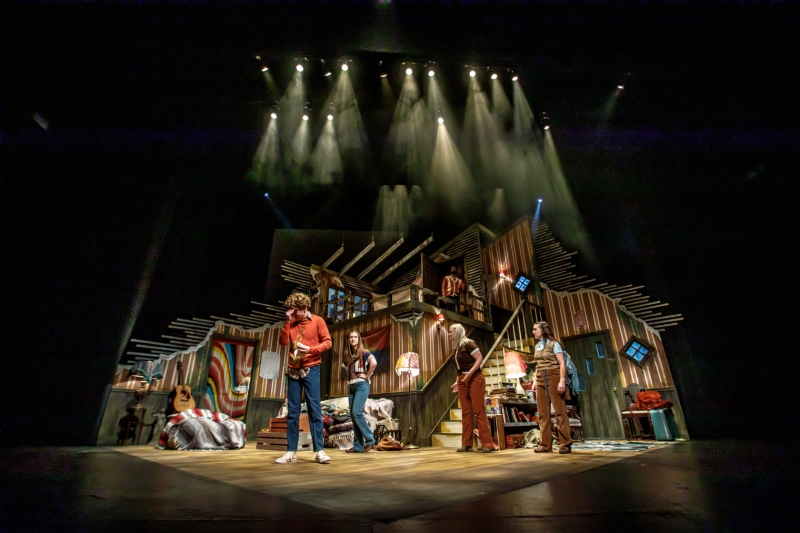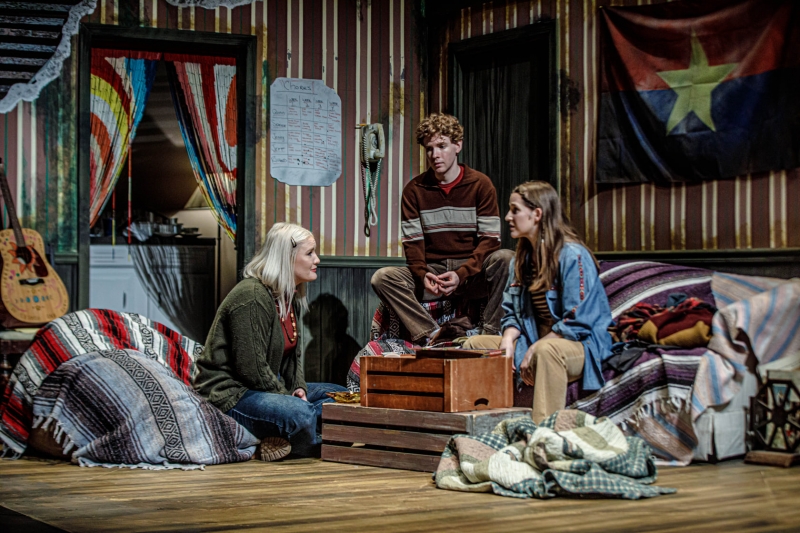Review: DAYS OF RAGE at Playhouse On The Square
When raging is all the rage

"Life's but a walking shadow, a poor player
That struts and frets his hour upon the stage,
And then is heard no more. It is a tale
Told by an idiot, full of sound and fury,
Signifying nothing." William Shakespeare

After a 17-month pandemic-induced hiatus, Playhouse on the Square has finally opened its doors again to an in-person audience with its season premiere of DAYS OF RAGE (now through September 19th). But just when we thought it was safe to congregate again, Shelby County is now wrestling with the ongoing challenges of the latest COVID Delta Variant and theatres across the Mid-South find themselves scrambling to figure out how to present much-needed live theatre without killing anyone. For now, Playhouse seems content to socially distance the audience, while still allowing the actors to perform without masks or shields. Memphis theatres may have thought they were at the end of this nightmare, but, in many ways, it feels like they are right back at the beginning.
As with other annoying plagues, wars and monumental events in human history, these things are often measured by their beginnings and endings. Is the ending of a pandemic the beginning of health? Is the loss of a relationship the beginning of freedom? Is the ending of war the beginning of peace? Which end of these eventful "sticks" deserve to be recognized, celebrated, or mourned? Just one? Both? These are the questions to be grappled with in DAYS OF RAGE-a story about a collective of pot-smoking, polysexual, "stick it to the man" Vietnam War protestors who mistakenly believe their perspectives are the only ones that are correct (or even matter). It's about America's probable first generation to having ever experienced "wokeness" believing that "fairness" and "democracy" include majority rule on any given household decision including what everyone should have for dinner to whether or not to have group sex for dessert. It was a new perspective thought to be radical, enlightened, but, in the end, not actually transformative. As much as emerging adults in America (then, and even today) like to believe their ideals are radical and mark the "beginnings" of change, the reality is that they are usually dismissed by their elders as being too young, stupid or high to take seriously. In time, these rebels tire of the drugs, protest marches and free love and decide to get real jobs, settle for some stability and smirk at their innocence of youth-Boomers who've lost their boom.
Fueling these "make love not peace" hippies in the Vietnam era was undoubtedly the music. Artists such as Sly and the Family Stone, Simon and Garfunkel and The Mamas and the Papas either informed these protests or vice versa, but they have been inseparably linked ever since. Under the resolute direction of Courtney Oliver, DAYS OF RAGE is fully underscored with almost non-stop music at varying volumes to heighten the emotions of the "struggle." At times, the music drowns out the actors and, if you're not careful, you'll find yourself getting more lost in the music than the story. It's a strong artistic choice that I'm guessing audiences will either love or hate. I'm somehow still on the fence.
Written by Steven Levenson (DEAR EVAN HANSEN), the play chronicles a small (emphasis on the word "small") group of pacifists trying to recruit students from the local college to attend an upcoming Vietnam War protest rally in Chicago. In between smoking, drinking and sexing, they pass out protest leaflets and extol their virtues to anyone who may listen. Surprising to only them, very few people do. Believing they are much more noble and important than anyone else does, their "rage" grows perhaps more due to their lack of impact than the war itself. The only thing sadder than being willing to die for a cause you believe in is dying for a cause no one believes in.

Despite strong actors in this "coming-of-age" tale, only a couple are able to emerge as fully developed characters. The majority of them seem to represent the "every man (or woman)" of 1960's civil disobedience. Haley Wilson represents the stoic, but slowly disillusioned female, while Brooke Papritz is a stand-in for the angrily misunderstood woman of the time. Nathan McHenry easily fades into the role of a "follower," who believes in the cause, but without the passion (Living with multiple women who provide unlimited sex and drugs can do that to a man). Caroline Simpson though as Peggy is a standout as a familial (more than societal) rebel who plays the cohort like an electric guitar. She's on the team for the fun of it and, like the rest of the world, never takes the mission too seriously. The most complex character of the night is Darious Robertson's Hal--a black man living in an already dangerous America just trying to survive. He and his family represent profound irony and contradictions related to patriotism that is totally lost on his white brethren. While his Caucasian counterparts try to end what they deem to be an unnecessary war via outspoken and controversial tactics, Hal's very own brother volunteers (instead of being drafted) for Vietnam hoping to protect his fellow Americans from harm's way. Hal quietly puts on a suit everyday and goes to work while watching these self-centered, entitled know-it-alls enjoy the luxury of standing on street corners "educating" every passerby on what's wrong with the world. Hal and his family can't risk not doing right by America while his comrades defiantly give it the middle finger. Who's the patriot? Robertson nicely walks this fine, yet scary tightrope.
Technically, this is a strong production for Playhouse on the Square. Designer Lex von Blommestein's big, sturdy set of the revolutionary wannabe's dilapidated home provides just the right amount of "dorm room" dingy, but with strong, visible bones. It evokes the resiliency and history of an abode witnessing the transient nature of rough and tumble kids who are out to change the world only to eventually let the world change them. Justin Gibson's lighting design proves to be functional without distracting (just the way it should be) and Jason Eschhofen's sound design offers a plethora of 60's musical hits that could stand better balancing with the actor's vocals.
All in all, this turns out to be a "memory play." For audience members who are old enough to have lived through the Vietnam War and its protests, you are sure to identify with what it meant to hear those songs and live in a war-weary America that started (perhaps for the first time) to acknowledge this country's questionable thirst for savagery. Before Vietnam, wars were not televised for the world to see. Little old ladies and children simply admired the "cause" without seeing or hearing the gory details. Citizens never questioned their government or criticized their methods. Before television, war changed the soldiers who fought, not the relatives at home. For those too young to remember this period in American history, you'll still recognize these outspoken young adults who feel they know better than anyone else. Did they represent or inspire change in the world? Less than they had thought. Did they inspire change in themselves? Less than they had hoped.
Reader Reviews

Videos

